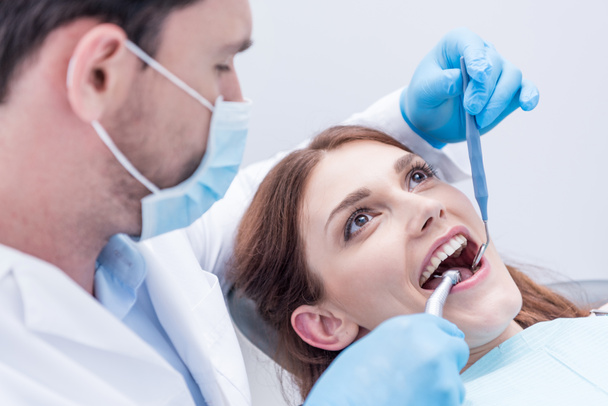Key Takeaways:
- Dental Check-Ups are Essential: Regular dental visits are critical for maintaining oral health and, by extension, overall well-being. They’re not just for when there’s a problem; they’re a preventative measure.
- Personalised Visit Frequency: While the six-month rule is a good guideline, the frequency of dental visits should be tailored to individual needs, which can vary based on personal oral hygiene, habits, genetics, and lifestyle.
- Early Start for Kids: In Australia, it’s recommended that children begin dental visits with the appearance of their first tooth or by their first birthday. Regular check-ups from a young age are important for long-term dental health.
- Communication is Key: Effective communication with your dentist can significantly improve the quality of care. Don’t hesitate to discuss any concerns or symptoms you’re experiencing.
In Australia, where the health system emphasises prevention and regular check-ups, understanding the frequency of dental visits is key to maintaining that quintessential Aussie smile. It’s not just about looking good on Bondi Beach or flashing a grin at the Melbourne Cup; it’s about your health. Visit https://radiantsmiles.com.au/dentist-albany/ to learn more.

What to Expect During Your Dental Visit
The Check-Up
When you pop into your local dental clinic, a thorough examination is the first step. Aussie dentists are on the lookout for cavities, plaque, gum disease, and they often screen for oral cancer – a simple step that could be life-saving.
The Cleaning Process
Professional cleaning by a dental hygienist is standard fare during your check-up. It’s more than just a spit and polish; it’s about reaching the spots your brush can’t and warding off decay and disease.
Signs You Need a Dental Visit Sooner
If you’re experiencing discomfort, sensitivity, or other changes, it’s time to stop ignoring and start booking. These symptoms could indicate underlying issues that require immediate attention.
Navigating Dental Care in Australia: Public vs Private
In Australia, the choice between public and private dental care can influence the frequency and type of care you receive. Public dental services are often more affordable but may have longer wait times, while private care offers more immediacy and often a broader range of services.
Frequency of Dental Visits: Tailoring to Your Needs
Factors Influencing Your Visit Frequency
Personal habits, genetic predispositions, and lifestyle choices can all influence how often you should be sitting in the dentist’s chair.
Is the 6-Month Rule Universal in Australia?
The age-old recommendation of a check-up every six months is widely touted, but many Australian dentists now take a more personalised approach. Let’s unpack whether this schedule suits everyone or if it’s time for a change.
Kids’ Dental Health: Starting Them Early
When to Begin
The first dental visit should happen around the eruption of the first tooth, usually before their first birthday. Early visits are crucial for setting children on a path of lifelong dental health.
Regular Check-Ups and Their Importance
Regular dental visits for children are not just about cavity checks; they are essential for monitoring the development of jaws and teeth, orthodontic concerns, and instilling good oral hygiene habits from a young age.
The Rise of Teledentistry in Australia
Can Virtual Consultations Replace Face-to-Face Visits?
With the advent of telehealth, many Australians wonder if virtual consultations can replace in-clinic visits. While they can be useful for follow-up and minor issues, they can’t yet replicate the effectiveness of a hands-on examination.
FAQs
is dental care covered by Medicare in Australia?
Dental care is not typically covered by Medicare for most Australians. There are some exceptions, however, for eligible individuals such as the Child Dental Benefits Schedule (CDBS) which covers part of the cost of dental services for children aged 2-17 years. Adults with a Health Care Card or Pensioner Concession Card may also access some state-provided dental services, but these can vary by state and territory and often involve waiting periods.
How can I find a good dentist in my area?
To find a reputable dentist in your area, consider asking for recommendations from family, friends, or your GP. Additionally, you can search the Australian Dental Association’s ‘Find a Dentist’ tool online, which allows you to search for accredited dental professionals by location and speciality.
What should I do in case of a dental emergency?
If you have a dental emergency, you should contact your dentist immediately. Most dental offices have provisions for emergency appointments or will advise you on the appropriate action. If the emergency occurs after hours, look for an after-hours dental service in your area, or, in the case of severe emergencies, visit the emergency department of your local hospital.
Can I still go to the dentist during COVID-19 restrictions?
Dental practices in Australia are open and operating with additional infection control precautions in place. However, during periods of heightened restrictions, some services may be limited to essential treatments only. It’s best to check the current guidelines from your local health department or contact your dental office directly for the most up-to-date information.
Are there any government schemes to help with children’s dental care?
Yes, the Australian Government offers the Child Dental Benefits Schedule (CDBS), which provides up to $1,026 over two calendar years for children aged 2 to 17 years for basic dental services. Eligibility is based on receiving certain government benefits, such as Family Tax Benefit Part A. Some states and territories may offer additional dental programs for children, so it’s worth checking with your local health department for more information.